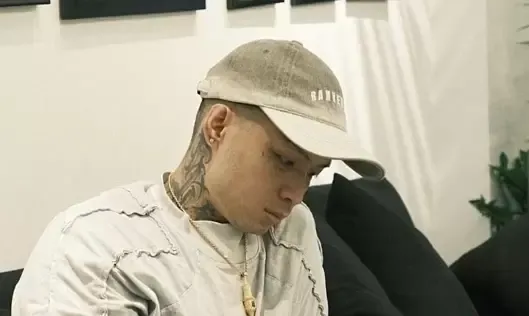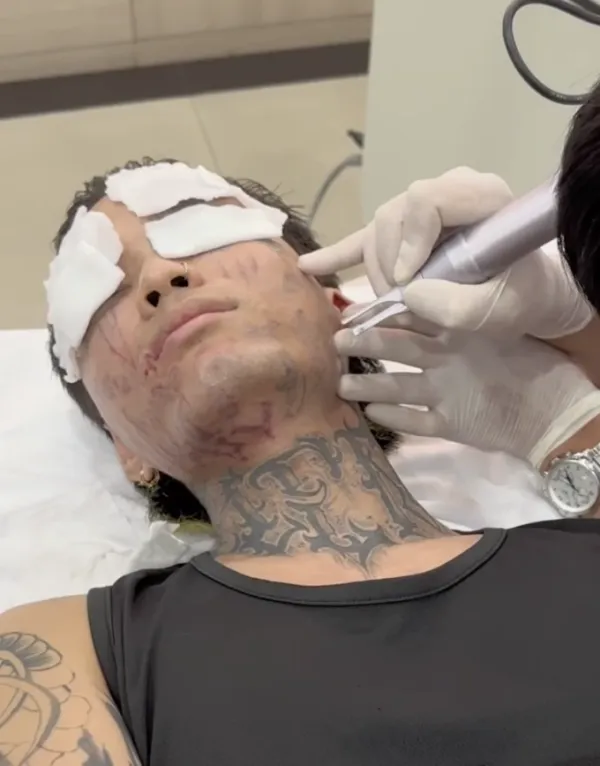
A tattoo artist for more than 10 years, Phuc, also known as Happy Truong, once viewed his facial tattoos as “accessories” that made him stand out in the community.
“I tattooed my face to force myself to master my craft and make a living from it,” he says.
Born into a poor family in northern Vietnam, he moved to Ho Chi Minh City in 2016 to build a career. His facial tattoos helped him stand out, attract clients and overcome difficult times, he believes.
“They warned people not to mess with me and showed that I was a tattoo artist.”
He faced little prejudice, the tattoos carry good memories and did not hinder his work.
But as he matured, he realized the tattoos no longer suited him.
“Each mark reminded me of something, but now those memories are already deeply imprinted in my mind, they don’t need to be on my face,” he says.
As a tattoo instructor, he wanted to set an example for his students and chose to remove the tattoos to become “a normal person” and be recognized for his skills.
|
Truong Hanh huc before removing his tattoos. Photo courtesy of Phuc |
His tattoo removal efforts began two years ago. He underwent eight laser sessions costing VND60 million (US$2,281) for his face and spent another VND10 million for skincare products. It was not only expensive but also painful and time-consuming.
After the second session, his face blistered severely.
“I panicked, wondering if I had ruined my face forever and whether I had made a mistake,” he says.
Fortunately, his skin recovered after a few days as he followed his doctor’s instructions. He had to follow a strict aftercare routine: eat well, drink plenty of water, apply cream three times a day, and cleanse with saline.
He still needs at least four more sessions to erase the tattoos completely.
After the surgeries, Phuc’s career took off. Clients became more diverse and open, allowing him to create better designs. He also began getting endorsement deals from dermatology hospitals and aesthetic clinics, opportunities previously unavailable due to his tattoos.
“My parents were the happiest, as they finally saw my face clearly after more than 10 years,” he says.
They once worried but did not interfere because he was “stubborn,” he says. Now they are delighted, and he has become a “superhero” in their eyes.
|
Truong Hanh Phuc after removing his facial tattoos, with faint ink traces remaining. Photo courtesy of Phuc |
After years of inspiring tattoo-loving youths, Phuc realized his dramatic facial tattoos might unintentionally encourage others to make impulsive decisions, such as tattooing their faces.
He now shares his removal journey online, hoping to convey the message that “You don’t need tattoos on your face to show your dedication.”
Tattooing has surged in popularity, especially among young people.
But a 2021 Statista survey found that 12% regretted getting tattoos. Another poll found that nearly half of people aged 18–35 had tattoos, and a quarter of them had regrets.
The global tattoo removal industry is projected to reach US$800 million by 2027.
In Vietnam, online forums dedicated to tattoo removal attract thousands seeking advice, often due to career concerns, family pressures, lifestyle changes, or breakups involving ex-partner names.
Dr. Phan Ngoc Huy of the Ho Chi Minh City Dermatology Hospital says most properly performed tattoo removals are safe. Doctors plan treatments according to the patient’s tattoo characteristics and skin type, determining the number of sessions, intervals, possible side effects, and expected outcomes, he explains.
Effectiveness depends on skin tone, tattoo location, color, and ink composition. Dark colors like black fade more easily, while green, blue, red, and pale tones can be more difficult or react unpredictably.
Typically, six to eight sessions are needed for optimal results.
After removal, the skin may be red or slightly irritated but rarely blisters. Patients must follow aftercare instructions, apply moisturizer and avoid sunlight to prevent hyperpigmentation.
Large tattoos and certain ink pigments including red may cause swelling or allergic reactions.
Older removal methods like dermabrasion or strong acids can leave severe scarring, but modern lasers too carry risks of pigment changes and scarring.
Dr. Huy says: “Tattoos stay in the skin for a long time. It’s best to think very carefully before getting one.”
Though he endured pain twice, once to tattoo and again to remove, Phuc says has no regrets.
“I should have removed them sooner.”
It was not about surrendering to stigma, but about self-improvement and inspiring the tattoo community.
 |
|
Truong Hanh Phuc during the tattoo removal process. Photo courtesy of Phuc |